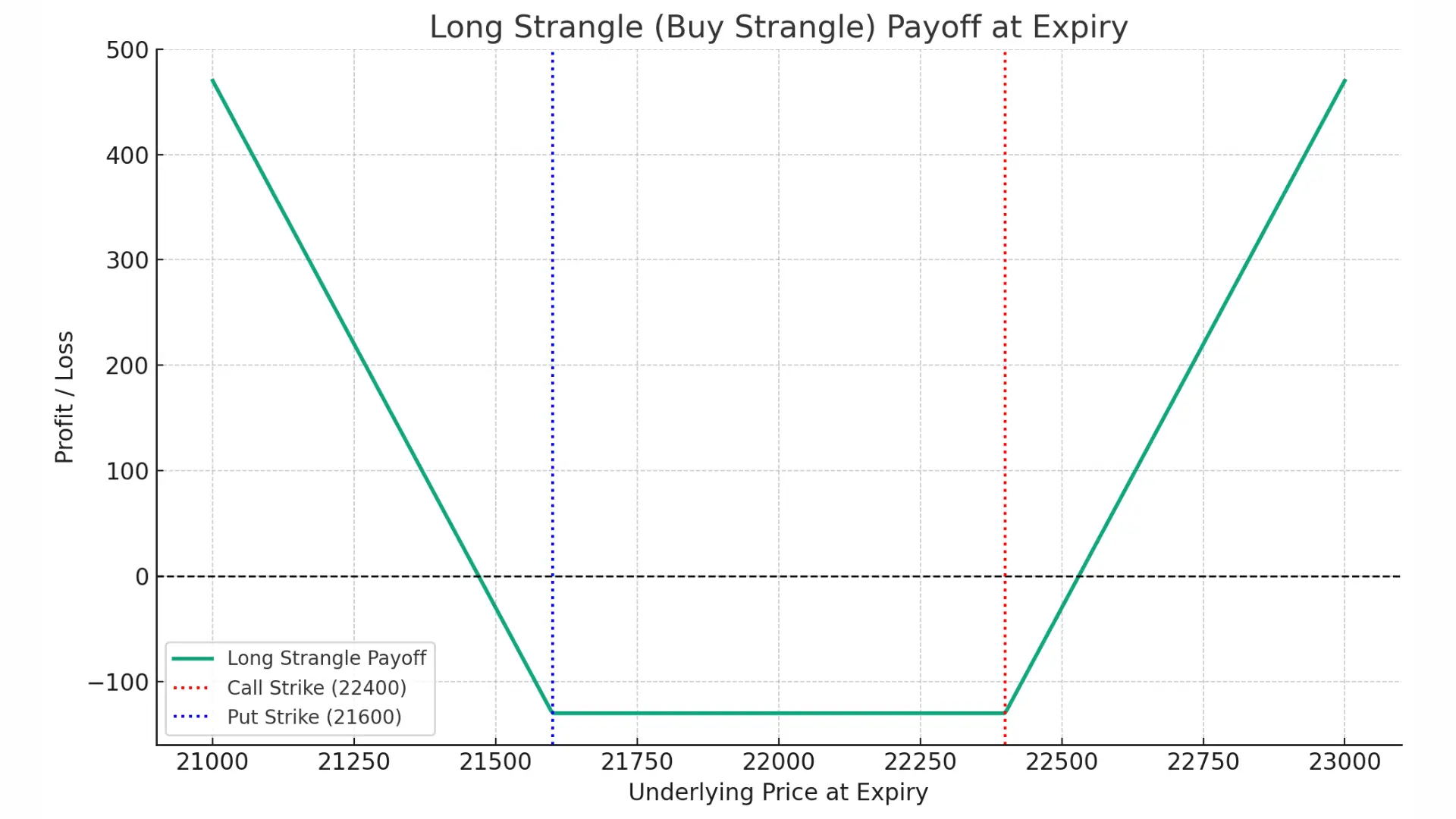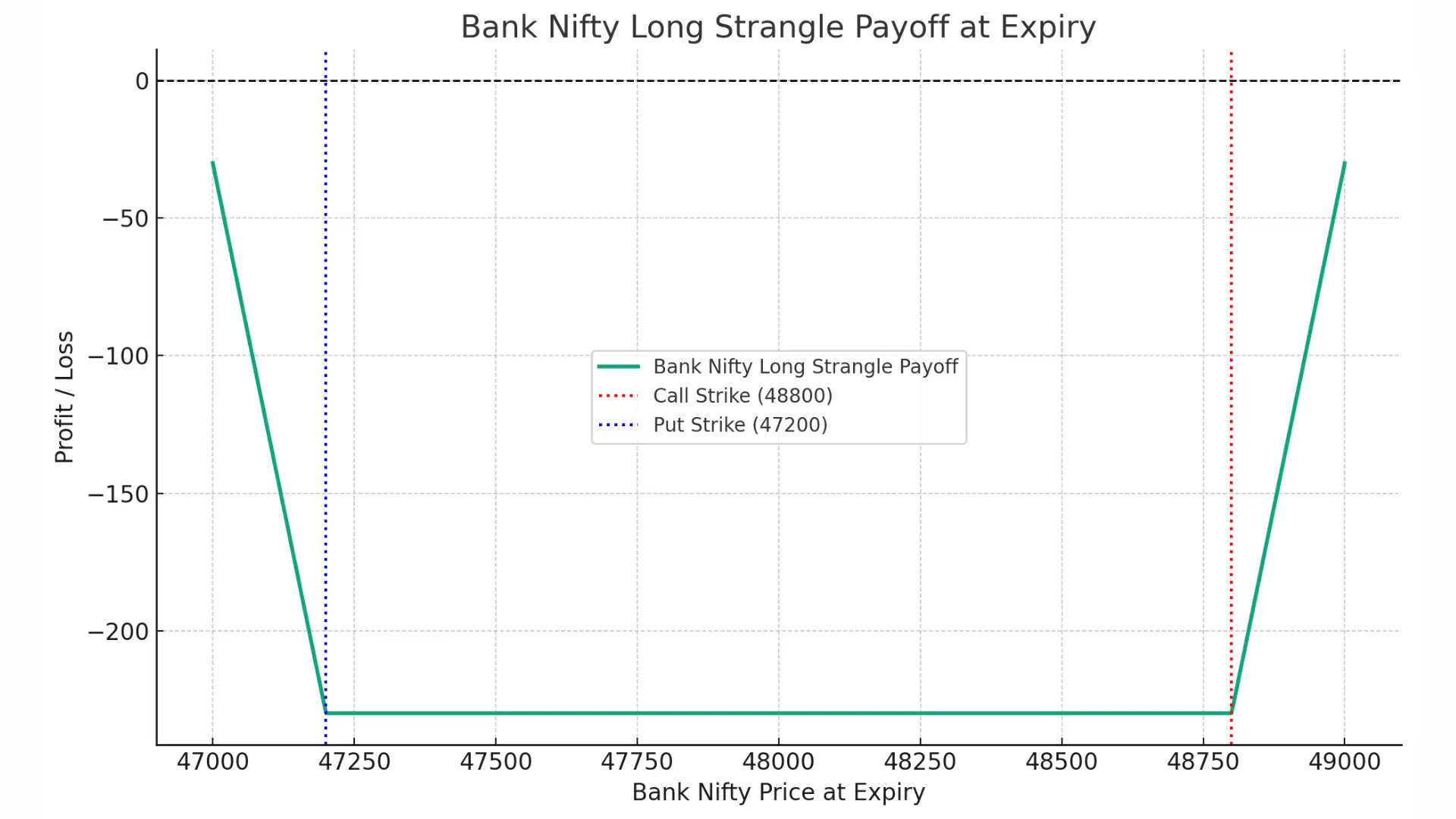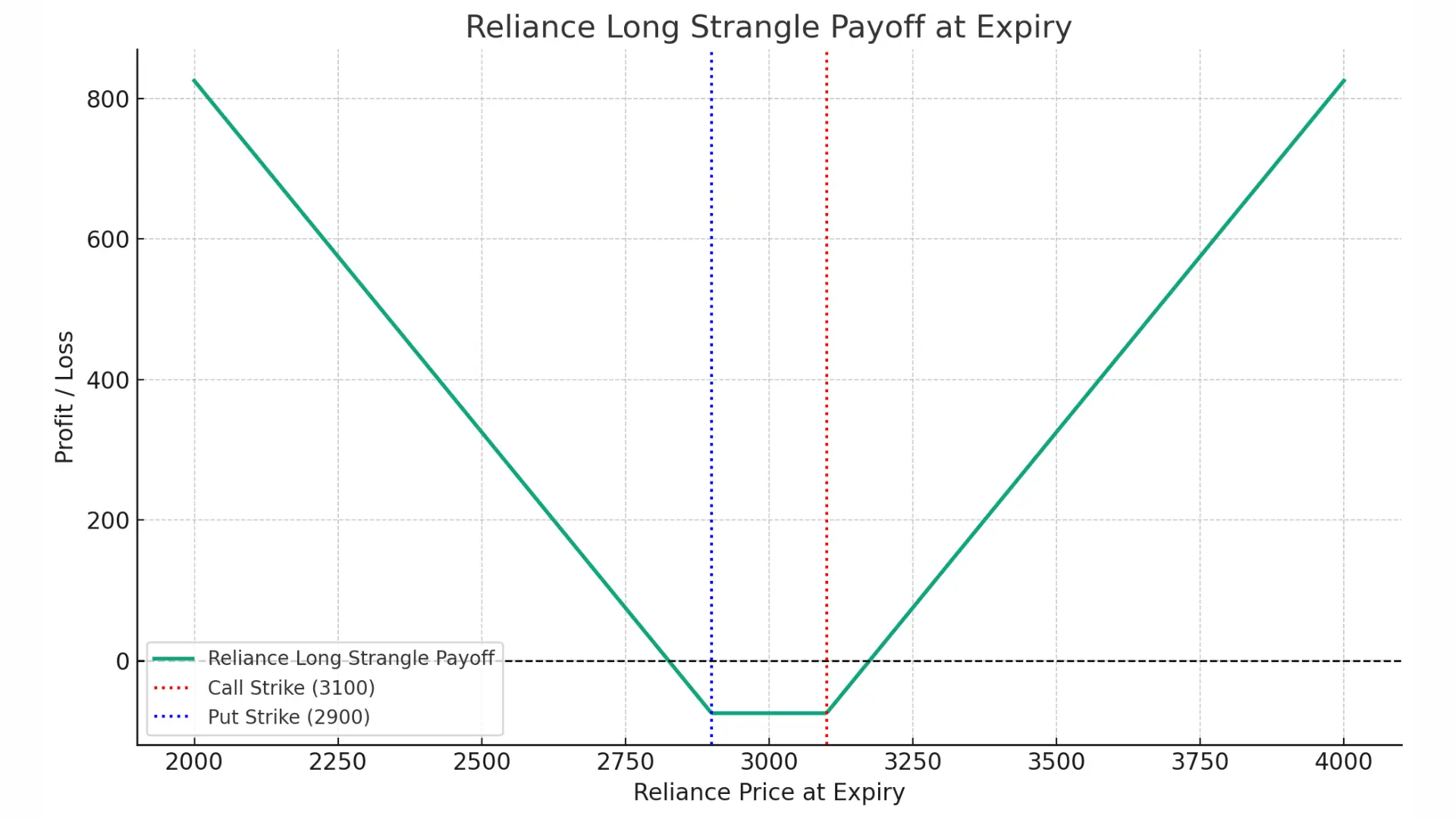📌 Table of Contents
- 🧠 What Is a Long Strangle Strategy?
- 🔍 Key Features
- 🧮 How Does It Work?
- 📊 Live Market Examples
- 💰 When to Use
- 📉 Payoff Graph
- ❓ FAQs
- 🔚 Conclusion
🧠 What Is a Long Strangle Strategy?
The Long Strangle, also known as Buy Strangle, is a neutral options trading strategy. It involves buying an out-of-the-money Call and an out-of-the-money Put on the same underlying asset, with the same expiration date. This strategy profits when there is a significant move in either direction—up or down. It is ideal during periods of high volatility expectations.
🔍 Key Features of Long Strangle
| Feature | Description |
|---|---|
| Market View | Neutral (expecting big movement) |
| Instruments Used | 1 OTM Call + 1 OTM Put |
| Number of Legs | 2 |
| Risk | Limited to premium paid |
| Reward | Unlimited profit potential upward; significant on the downside |
| Breakeven Points | Two (Call strike + premium, Put strike − premium) |
🧮 How Does It Work?
Assume:
- Underlying: Nifty
- Current Nifty Price: ₹22,000
- Buy 22,400 CE @ ₹60
- Buy 21,600 PE @ ₹70
- Total Premium Paid: ₹130
Breakeven Points:
- Upper Breakeven: 22,400 + 130 = 22,530
- Lower Breakeven: 21,600 − 130 = 21,470
If Nifty moves above 22,530 or below 21,470, the strategy becomes profitable.
📊 Live Market Examples (As of 05 August 2025)
🔹 Example 1: Nifty Index
- Current Price: ₹22,000
- Buy 22,400 CE (OTM Call) @ ₹60
- Buy 21,600 PE (OTM Put) @ ₹70
- Total Cost: ₹130
✅ Ideal if Nifty moves above 22,530 or below 21,470 before expiry.
Payoff Graph:

- 🔴 Red dotted line = Call Strike (₹22,400)
- 🔵 Blue dotted line = Put Strike (₹21,600)
- 📉 Loss maxes at ₹130 if price remains between ₹21,600 and ₹22,400.
- 📈 Profits above ₹22,530 or below ₹21,470.
🔹 Example 2: Bank Nifty Index
- Current Price: ₹48,000
- Buy 48,800 CE @ ₹120
- Buy 47,200 PE @ ₹110
- Total Cost: ₹230
✅ Profits start above 49,030 or below 46,970
📉 Bank Nifty Long Strangle Payoff

- 🔴 Call Strike: ₹48,800
- 🔵 Put Strike: ₹47,200
- 💰 Total Premium Paid: ₹230
- 📈 Profit if Bank Nifty moves above ₹49,030 or below ₹46,970
🔹 Example 3: Reliance Industries (Stock)
- Current Price: ₹3,000
- Buy ₹3,100 CE @ ₹35
- Buy ₹2,900 PE @ ₹40
- Total Cost: ₹75
✅ Profitable above ₹3,175 or below ₹2,825
📉 Reliance Industries Long Strangle Payoff

- 🔴 Call Strike: ₹3,100
- 🔵 Put Strike: ₹2,900
- 💰 Total Premium Paid: ₹75
- 📈 Profit if Reliance moves above ₹3,175 or below ₹2,825
💰 When to Use a Long Strangle Strategy?
- A major event (budget, earnings, RBI policy) is expected.
- Implied volatility is moderate to low (as high IV inflates option premiums).
- You expect a big directional move but unsure which way.
📉 Payoff Graph
The maximum loss is limited to the total premium paid. Profit potential is unlimited on the upside and significant on the downside. The strategy resembles a "V" shape with a flat bottom at the maximum loss area.
❓ FAQs: Long Strangle Strategy
Q1: What is the main difference between a Long Strangle and a Long Straddle?
A: A Long Straddle uses ATM options; a Long Strangle uses OTM options, making it cheaper but needing a bigger move.
Q2: Can I exit a Long Strangle before expiry?
A: Yes, you can exit at any time during market hours to minimize loss or capture profit.
Q3: What is the risk in a Long Strangle?
A: The risk is limited to the total premium paid for both options.
Q4: Is Long Strangle better in high volatility?
A: No, it's best entered before volatility spikes. Entering at a high IV makes the strategy expensive.
Q5: What if the stock remains range-bound?
A: The entire premium may be lost as both options decay in value.
🔚 Conclusion
The Long Strangle is a powerful strategy for traders anticipating high volatility but are unsure of the direction. With limited risk and potentially high rewards, it's a smart choice around market-moving events. Just ensure to manage time decay and choose your strikes wisely!

